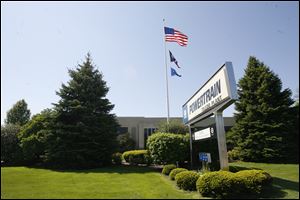
State finds GM failed to address nooses, racial slurs at Toledo Transmission plant
4/4/2018
General Motors Co. says it has done nothing wrong, in response to a finding that it failed to take action against racially charged incidents.
A state commission has said General Motors should have done more to protect its employees at a North Toledo factory from a spate of racially charged incidents, including nooses hanging from equipment and white employees using disparaging racial slurs to refer to their black coworkers.
The Ohio Civil Rights Commission opened an investigation into the Toledo Transmission plant last year after receiving a complaint from Ray Wood, the former president of United Auto Workers 14, which represents hourly workers at the plant.
In the course of its investigation, the commission documented at least three instances in which nooses were discovered in the plant between March and June of last year.
Investigators also noted that GM officials received at least two reports of Nazi symbolism being drawn on restroom walls in the last year, and that the company was aware of someone writing “whites only” on restroom stall doors in December.
Furthermore, witnesses told investigators that a racist poem had been distributed throughout the plant, targeting a white employee for her close relationship with Mr. Wood, who is black.
The poem included a line that said she had “sold out on her own” and included a racial epithet.
The commission’s initial findings, detailed in a March 16 letter obtained this week by The Blade, concluded General Motors maintained a “racially hostile work environment” and that there is probable cause that GM engaged in an unlawful discriminatory practice.
General Motors has denied any wrongdoing, and has asked the commission to reconsider its ruling. That review is pending.
In a statement to The Blade, the company said:
“General Motors is aware of the Ohio Civil Rights Commission’s findings related to our Toledo plant. The company promptly investigated and addressed unfortunate incidents that occurred at the facility. GM has a strong anti-discrimination and anti-harassment policy, and we encourage employees to report any incidents of harassment without fear of retaliation. GM strongly denies that we violated any laws, and we appreciate the opportunity to further explain to the OCRC our position and the steps we have taken.”
The plant has about 1,600 hourly workers. Roughly a quarter of them are minorities.
A final determination from the Ohio Civil Rights Commission board is expected to be made on Thursday. Mr. Wood and his attorneys, as well as attorneys representing GM will be present at that hearing.
A spokesman for the Ohio Civil Rights Commission confirmed the initial findings to The Blade, though she said she was limited in what she could share about the case until it is finalized.
However, the initial report from the Ohio Civil Rights Commission describes a situation in which a racially hostile work environment was allowed to fester for months.
Following the discovery of the first nooses in March, 2017, the company briefly idled that part of the plant in order to interview employees. Company officials told investigators they were unable to determine who had hung the nooses.
Though GM provided management and team leaders with a presentation the following day, the Ohio Civil Rights Commission said it was about workplace violence, not workplace discrimination rules. The commission’s letter went on to say GM did not discuss racial issues or require employees’ attendance at meetings to address harassment until a third noose was found in June.
There were also allegations that white employees frequently used racially charged language toward black employees.
GM officials admitted to commission investigators an employee addressed black employees as “boy,” as well as calling them “monkeys.” A witness testified that the employee was not disciplined.
Witnesses also told investigators that team leaders and other employees frequently used an acronym that included a pointed racial slur to refer to African-American employees.
“Evidence supports that [General Motors] seemed indifferent to racial harassment and the minimal steps taken did not end the harassment,” the commission letter said.
Matthew Bryant, an attorney representing Mr. Wood, described GM’s response to the alleged incidents as “inadequate and poorly responsive” in an email to The Blade.
“It is a shame that on the day that we remember the 50 year anniversary of Martin Luther King, Jr.’s death, we are still confronted with situations like this within an employment setting by an employer, much less a major automobile manufacturer.”
Mr. Wood, who lost his UAW re-election bid last June and has since retired, said in an interview Wednesday he’s glad the investigation is heading toward its closure.
“I’m also excited about having the opportunity to give my point of view to whoever wants to hear it. I really try to not get out in front of anything or make it more difficult than what it is, because it’s difficult for me,” he said. “But at the same time there’s a lot of things that happened that should not have happened. Hopefully at the end of this we can make it to a point where our membership and workforce won’t be exposed to that type of hatred.”
If the Ohio Civil Rights Commission’s initial finding is upheld on Thursday, the two parties will have an option to reach a settlement. If a settlement can’t be reached, the commission can schedule a formal hearing before an administrative law judge and forward the case to the Ohio Attorney General's office.
Contact Tyrel Linkhorn at tlinkhorn@theblade.com, 419-724-6134, or on Twitter @TyrelLinkhorn.